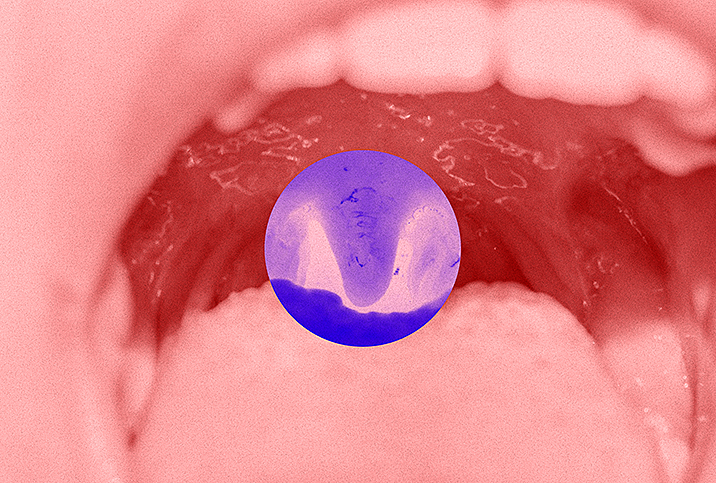Why Does My Throat Hurt After Oral Sex?

Sex is intimidating to talk about, especially oral sex. The hush-hush nature works to keep us silent, but let's get real—there are some important issues here, such as oral sexually transmitted diseases (STDs), that need to be addressed.
Let's clear up one thing first: If your throat hurts after oral sex on a penis (or penis-like object), it's likely the result of friction.
"The posterior pharynx [back of the throat] is sensitive, and the mucosal tissue can be irritated from the contact," said Asia Sullivan, a physician assistant. "Of course, it's also possible to contract sexually transmitted infections (STIs) and STDs such as gonorrhea, chlamydia, syphilis, herpes simplex virus and human papillomavirus, but your throat may not hurt immediately from those. While not directly related to oral sex, one may contract strep throat or other viral illnesses such as the common cold while kissing, snuggling, sharing drinks and so on."
When should people seek medical help?
Krishna Upadhya, vice president of Quality Care and Health Equity for Planned Parenthood Federation of America, emphasizes prompt action.
"Gonorrhea and chlamydia are usually easily cured with antibiotics. But if you don't treat them early enough, they can lead to more serious health problems in the future," Upadhya said. "That's why STI testing is so important: STIs don't always have symptoms, and the sooner you know you have a sexually transmitted infection, the faster you can get rid of it."
If you develop the following symptoms, Sullivan recommends seeking medical help:
- Fever
- Difficulty swallowing
- Pain in the throat that is severe or knife-like
- Sore throat that lasts longer than a few days (five to seven days after exposure)
- Lymph node swelling/tenderness under the jawline
"People should seek medical help from a healthcare provider if they notice a sore throat that interferes with swallowing or breathing, if they have a partner with an STI or symptoms [of an STI], or if they're simply concerned about [their own] symptoms," Upadhya added. "The best thing to do is check in with a doctor or nurse or your nearest Planned Parenthood health center as soon as possible, and get it checked out."
How common is it to get STDs in your throat?
Genital chlamydia and gonorrhea are both very common. Nearly 3 million Americans get chlamydia every year, mostly among people 24 years old and younger.
"Approximately 1.6 million new gonorrhea infections occurred in the United States in 2018, more than half among people 24 and younger," Upadhya said. "It's hard to know for sure how common chlamydia and gonorrhea infections in the throat are, but studies have found a range of 2 percent to 10 percent for gonorrhea, depending on the population studied. Chlamydia infections are less common."
Upadhya recommends people speak to their doctor or nurse about risks and symptoms to determine whether they should be tested or not.
So, is it okay to have oral sex?
"It is generally safe to engage in oral sex," Sullivan said. "However, it's important to understand that it's not without the risk of bacterial and viral STIs and STDs, such as gonorrhea, chlamydia, herpes simplex virus and human papillomavirus.
"There are ways to protect yourself when engaging in oral sex," Sullivan continued. "Dental dams (a thin barrier between your mouth and the partner's vagina and anus) or flavored condoms are an option. Communication with your partner(s) is key. If you're feeling physical discomfort in the mouth, jaw, throat while engaging, stop or slow down. The experience should be enjoyable for both of you."
'Getting tested regularly and using condoms and/or dental dams every time you have sex is the best way to help prevent the transmission of STIs.'
Upadhya also shared her suggestion on how to engage in oral sex safely.
"Everyone deserves a sex life that is happy and healthy," Upadhya said. "A lot of people think that oral sex is safer than anal or vaginal intercourse. That's true when it comes to HIV, but oral sex can spread other infections, like herpes, syphilis and hepatitis B. Getting tested regularly and using condoms and/or dental dams every time you have sex is the best way to help prevent the transmission of STIs."
How do I know what I've got?
Scheduling a doctor visit is always best, but knowing key differences between chlamydia, gonorrhea, the common cold and strep throat can help you identify what the problem might be.
Common cold
The symptoms of the common cold can vary from person to person, but there are general signs to watch out for.
"It's usually a viral infection of your nose and throat, caused by different kinds of rhinoviruses," Upadhya said. "Symptoms usually appear one to three days after exposure and may include a sore throat, runny nose, cough, congestion, body aches or headaches, and/or a low fever. It usually clears up on its own in about a week and a half."
Strep throat
Strep throat is a bacterial infection that makes your throat feel sore, usually contracted through coughing, sneezing, sharing food and drinks, or touching your eyes and nose after touching a surface containing group A Streptococcus bacteria.
Symptoms of strep throat can be very painful:
- Sore throat
- Pain when swallowing
- Fever
- Red and swollen tonsils
- Swollen lymph nodes in the front of the neck
"Severe pain with fever and lymph node swelling is more common with strep throat," Sullivan emphasized. "White spots on the tonsils called exudates usually indicate strep throat. Severe pain and the presence of blister-like lesions can indicate a herpes outbreak. All of these conditions are diagnosed with a simple throat swab."
Gonorrhea
Gonorrhea is a common sexually transmitted disease, especially for teens and people in their 20s, but it can be cured with antibiotics. This STD is not spread through casual contact, such as sharing food or drinks, kissing, hugging, sneezing or coughing. It is usually transmitted through vaginal, anal or oral sex, as the bacteria is carried in semen, pre-ejaculate and vaginal fluids.
Oral gonorrhea is not as common as genital gonorrhea, but it does occur. Gonorrhea infections in the throat rarely present symptoms, but it may cause an itchy or sore throat that lingers for a while. Sullivan noted there are many people who do not experience any symptoms of an STI or STD in the throat. Indeed, chlamydia and gonorrhea may not show up in the throat for several months or years. This is also why it is important to get regular screening for a sexually transmitted infection, even when symptoms are not prevalent.
Chlamydia
Like gonorrhea, chlamydia cannot be spread through sharing food or drinks, kissing, hugging, holding hands, sneezing or coughing.
"The main ways people get chlamydia are from having vaginal sex and anal sex, but it can also be spread through oral sex," Upadhya said.
Again, most people who have chlamydia do not show symptoms.
"Strep throat, chlamydia and oral gonorrhea are different infections and should be treated with different antibiotics, which can only be prescribed by a doctor or a nurse after determining what's causing your sore throat," Upadhya added.
Chlamydia and gonorrhea are bacterial infections that can be treated with antibiotics prescribed by a doctor, and treatment can last up to seven days, depending on the method. Upadhya also emphasized the importance of consuming all medication prescribed for you, even if the symptoms disappear before you have finished the prescribed treatment.
Preventing the risk of STIs/STDs during oral sex
So how can we prevent discomfort and getting sexually transmitted infections in our throat when we want to engage in oral sex? Here are some easy guidelines to follow:
- Get tested regularly
- Use condoms
- Use dental dams
- Communicate openly with your partner/s
Keep in mind that people with STIs/STDs may not show any symptoms or be aware they are infectious, but can still pass on their disease to you. Having conversations about getting tested for STDs/STIs can be intimidating, but it is more important to remain safe.
"If you test positive, you can both get treated and get on with your lives," Upadhya said. "Just like we protect ourselves and others from a cold or strep throat by washing our hands regularly and covering our mouths when we cough or sneeze, we can protect ourselves and our partners from STIs by practicing safer sex, getting tested and having open, honest communication about our sexual health."
Oral sex can be a fun, adventurous and a gloriously intimate experience. Take a few precautions and get tested regularly, and it always will be.


















